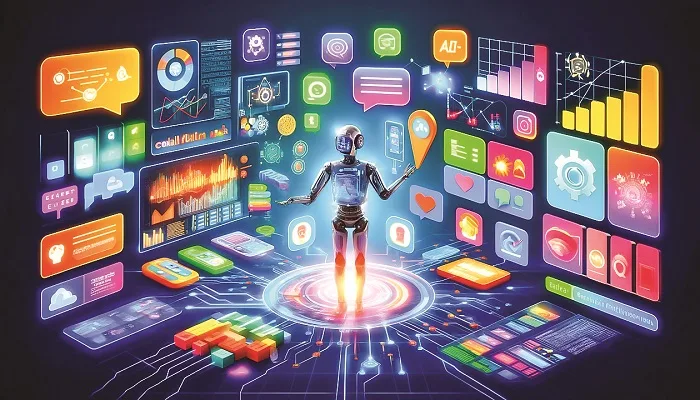Exploring the Future of Social Media Through the Lens of AI

Artificial Intelligence (AI) has revolutionised numerous industries, and social media is no exception. By enhancing user experience and providing powerful tools for marketers, AI has reshaped the way we interact online. This article explores how AI is changing social media today and how it might evolve in the future.
Enhancing User Experience Through Personalisation
AI has dramatically improved the personalisation of content on social media platforms. Algorithms analyse user behaviour, preferences, and interactions to curate tailored content feeds, ensuring users see posts that are most relevant to them. This not only keeps users engaged but also increases the time they spend on platforms. By predicting what content will interest users, AI helps social media platforms deliver a more customised and satisfying experience.
For instance, AI-driven recommendation systems on platforms like Instagram and TikTok suggest content based on user activity. This personalisation extends to advertisements, where AI analyses user data to present the most pertinent ads, enhancing click-through rates and ROI for advertisers. As AI technology advances, the precision of these recommendations will only improve, further enhancing user satisfaction and engagement.
Automating Customer Service and Interaction
AI-powered chatbots and virtual assistants have become integral to social media customer service. These tools can handle numerous queries simultaneously, providing instant responses to common questions and freeing up human agents for more complex issues. This efficiency not only improves customer satisfaction but also reduces operational costs for businesses.
Chatbots on platforms like Facebook Messenger and Twitter can assist with tasks ranging from order tracking to troubleshooting, ensuring users receive prompt and accurate information. As natural language processing (NLP) technologies advance, these chatbots are becoming more sophisticated, capable of understanding and responding to a wider array of inquiries with a human-like touch.
Enhancing Content Creation and Management
AI tools are revolutionising content creation and management on social media. From generating creative ideas to automating posting schedules, AI assists marketers in maintaining a consistent and engaging online presence. AI-driven platforms like Canva and Adobe Spark enable users to create visually appealing graphics and videos with minimal effort, leveraging AI to suggest design elements and layouts.
Moreover, AI can analyse the performance of past posts to recommend optimal posting times and content strategies. This data-driven approach ensures that content not only reaches a wider audience but also resonates more effectively, driving higher engagement rates. In the future, AI could further enhance content creation by generating entire posts or even managing social media accounts autonomously.
Additionally, AI can help in identifying trends and predicting viral content, allowing brands to capitalise on emerging topics before they become mainstream. This foresight can be crucial for staying relevant in the fast-paced world of social media.
Strengthening Security and Moderation
One of the critical roles of AI in social media is ensuring platform security and content moderation. AI algorithms are employed to detect and remove harmful content, such as hate speech, misinformation, and spam. These systems scan millions of posts in real-time, identifying patterns and flagging content that violates community guidelines.
Platforms like Facebook and YouTube use AI to automatically filter inappropriate content, protecting users and maintaining a safe online environment. As these technologies evolve, they will become even more adept at distinguishing between harmful and benign content, reducing false positives and improving the accuracy of moderation.
Furthermore, AI can enhance user privacy by identifying and mitigating potential security threats, such as account hacks and phishing attempts. By continuously learning from new data, AI systems can stay ahead of malicious actors, ensuring users’ personal information remains secure.

Boosting Marketing and Analytics
AI has transformed social media marketing by providing advanced analytics and insights. Marketers can leverage AI to analyse vast amounts of data, uncovering patterns and trends that inform their strategies. This enables more targeted advertising campaigns, personalised content, and improved customer segmentation.
Tools like Google Analytics and Hootsuite utilise AI to offer detailed reports on user engagement, campaign performance, and audience demographics. These insights help marketers optimise their efforts, ensuring their content reaches the right people at the right time. As AI continues to evolve, we can expect even more granular and actionable insights, driving smarter marketing decisions.
Additionally, AI can automate A/B testing, dynamically adjusting campaigns based on real-time performance data. This adaptability ensures that marketing efforts remain effective, maximising ROI and improving overall campaign success.
Predicting Future Trends
The future of AI in social media holds immense potential. As AI technologies become more sophisticated, their ability to predict trends and user behaviour will improve, allowing platforms and marketers to stay ahead of the curve. Predictive analytics can identify emerging topics, helping brands to create content that resonates with their audience.
Moreover, AI could facilitate more immersive and interactive experiences through augmented reality (AR) and virtual reality (VR). These technologies, powered by AI, could transform how users interact with social media, offering more engaging and personalised experiences.
In conclusion, AI is not just transforming social media; it is shaping its future. From enhancing user experience and automating customer service to revolutionising content creation and boosting marketing efforts, AI’s impact is profound and far-reaching. As these technologies continue to evolve, the possibilities for further innovation in social media are limitless.
